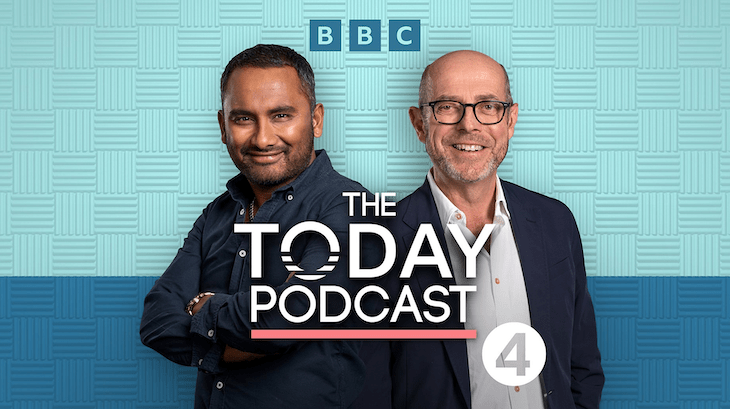Is there really room in the crowded market for a new podcast about politics, presented by two male Oxbridge graduates? The BBC thinks so: the team behind Radio 4’s Today programme is launching a new weekly podcast hosted by Nick Robinson and Amol Rajan. This is a ‘bold commitment from the BBC to continue to build the Today brand’, according to the, erm, BBC.
In case you are waiting for the punchline or the big reveal, there is nothing different about The Today Podcast. Its presenters will ‘give their take on the biggest stories of the week’, though the audience is also promised a range of guests and ‘insights from behind the scenes at Radio 4’s Today’. Nevertheless, in a 56-second clip released on X (formerly Twitter) at the weekend, Robinson and Rajan took the challenge head-on and asked themselves what made the new show unique.
In Robinson, Rajan told us, we have a former BBC political editor of vast experience, who has travelled with prime ministers and knows the rhythm of British politics almost by instinct. Meanwhile, Robinson told us, Rajan is a former newspaper editor who understands how modern media works and is changing, ‘not old media-land’. Underpinning their complementary skills is the BBC, with all its ‘knowledge and expertise and experience’.
Is Radio 4 just too late to the party with The Today Podcast?
If Robinson and Rajan think the jostle of political podcasts lacks experience, eminence or star quality, they are wrong. Current BBC political editor, Chris Mason, co-presents the Newscast podcast, and Andrew Marr, who held the job from 2000 to 2005, appears on the New Statesman’s podcast, while his LBC show is also repeated in podcast form. As for former newspaper editors, it does not take long to find the opinions of Lionel Barber (FT), Alan Rusbridger (Guardian), George Osborne (Evening Standard) or, indeed, the same Andrew Marr, who edited the Independent more than 15 years before Rajan himself.
Relying on the BBC brand to sell this podcast is also unwise. I’m a fan of the BBC but there is a lot about the corporation which needs examining, not least its cack-handed senior leadership, obsession with diversity and inclusion and questions over its funding by a mandatory licence fee. Yes, it has produced and broadcast some of the best television and radio ever made, and the World Service, which reached 365 million people weekly, has an enviable global reputation for trusted and impartial reporting. But its image has suffered recently, with the chairman, Richard Sharp, resigning over his failure to disclose his involvement in a loan paid to Boris Johnson; its uncertain handling of accusations of impropriety against newsreader Huw Edwards; and a general feeling that the corporation has a fundamental London-centric, middle-class bias.
Is Radio 4 just too late to the party with The Today Podcast? One of the most frequent criticisms of public-sector organisations is that they are unwieldy and slow to react to changes of direction. Because they are often bureaucratic and risk-averse, they cannot innovate and change at the rate of the private sector, often therefore lagging behind. The launch of this podcast seems like a perfect example of this phenomenon. What’s more, the BBC already has at least a dozen offerings in the field, including Political Thinking with Nick Robinson and, in recent years, Amol Rajan Interviews… But the strength of Today is surely that it is agenda-setting, that it is one of the major springboards for the day’s news, and taking away that immediacy from a weekly review of current events feels like tying one hand behind the back.
The field of political podcasts has a saturation point. Perhaps we have not yet reached it; we may not realise until it is too late, and there will be casualties. The mixed reception which greeted Political Currency with George Osborne and Ed Balls, both huge political figures and overseen by big producers Persephonica, suggests that the audience is at least approaching the stage of the fatal ‘waffer-theen’ mint. The danger for the BBC, and for its intrepid presenters, who will be given a can to carry if anything goes wrong, is not that the podcast will be bad. The trouble is that it needs to be much, much more than that for anyone to listen and care.







Comments